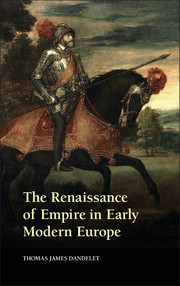Description
The Renaissance of Empire in Early Modern Europe
Author: Dandelet Thomas James
Examines the intellectual and artistic foundations of the Imperial Renaissance in fourteenth- and fifteenth-century Italy and traces its political realization in sixteenth- and seventeenth-century Europe.
Language: English
Subject for The Renaissance of Empire in Early Modern Europe:
The Renaissance of Empire in Early Modern Europe
Publication date: 04-2014
311 p. · 15.1x22.8 cm · Paperback
Publication date: 04-2014
311 p. · 15.1x22.8 cm · Paperback
Approximative price 68.82 €
In Print (Delivery period: 14 days).
Add to cart
The Renaissance of Empire in Early Modern Europe
Publication date: 04-2014
311 p. · 15.7x23.5 cm · Hardback
Publication date: 04-2014
311 p. · 15.7x23.5 cm · Hardback
Description
/li>Contents
/li>Biography
/li>
This book brings together a bold revision of the traditional view of the Renaissance with a new comparative synthesis of global empires in early modern Europe. It examines the rise of a virulent form of Renaissance scholarship, art, and architecture that had as its aim the revival of the cultural and political grandeur of the Roman Empire in Western Europe. Imperial humanism, a distinct form of humanism, emerged in the earliest stages of the Italian Renaissance as figures such as Petrarch, Guarino, and Biondo sought to revive and advance the example of the Caesars and their empire. Originating in the courts of Ferrara, Mantua, and Rome, this movement also revived ancient imperial iconography in painting and sculpture, as well as Vitruvian architecture. While the Italian princes never realized their dream of political power equal to the ancient emperors, the Imperial Renaissance they set in motion reached its full realization in the global empires of sixteenth- and seventeenth-century Spain, France, and Great Britain.
1. The rebirth of the Caesars; 2. The hybrid empire of Charles V, 1517–56; 3. The Spanish empire, apex of the Imperial Renaissance; 4. The Renaissance of empire in France; 5. Britain as Late Renaissance empire.
Thomas James Dandelet is Associate Professor of History at the University of California, Berkeley. He previously taught at Bard College and Princeton University. Dandelet was awarded the Rome Prize from the American Academy in Rome in 1999 and a Guggenheim fellowship in 2007. His first book, Spanish Rome, 1500–1700 (2001), won the Sixteenth Century Studies Conference Roland Bainton Prize for best book in history and theology in 2002.
© 2024 LAVOISIER S.A.S.
These books may interest you

Studies on Alberti and Petrarch 53.83 €

Studies on Alberti and Petrarch 164.74 €


